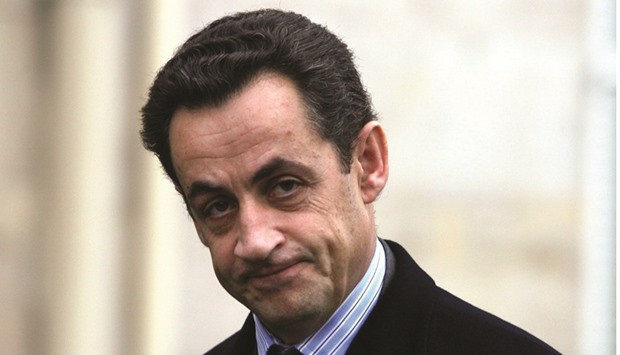France’s highest court has ruled that wiretapped conversations could be used in a corruption case against Nicolas Sarkozy, in a blow to the former president’s plans to run in elections next year.
The court ruling opens the way for investigating judges to decide whether to take the case against Sarkozy to trial.
“This is potentially the most devastating case for him,” a high-ranking member of Sarkozy’s Republicans party said on condition of anonymity after the ruling, in a reference to the many legal woes dogging the former president.
Sarkozy, 61, whose presidency was from 2007 to 2012, became the first former head of state to be taken into custody for questioning when he was charged with corruption, influence peddling and violation of legal secrecy in July two years ago.
He is accused of conspiring with his lawyer to give a magistrate a lucrative job in exchange for inside information on a different corruption probe against him, in conversations on a secret phone registered under an assumed name.
“An insane procedure is going to follow now,” Sarkozy’s lawyer Patrice Spinosi predicted after the ruling.
According to Spinosi the decision showed it was “possible to listen to a person even though he is having a conversation with his lawyer, with the sole motive that the phone line was opened under an assumed name”.
Sarkozy’s legal team has argued the recordings were a breach of lawyer-client privacy rules.
Spinosi said that the case against Sarkozy was “fragile” and could see France dragged in front of the European Court of Human Rights.
The former president has been dogged by legal woes, several related to alleged irregular funding of election campaigns.
Investigators took the unprecedented step of tapping Sarkozy’s phones from April 2013 as part of a probe into allegations that former Libyan strongman Muammar Gaddafi’s regime helped finance his 2007 campaign.
In the recordings Sarkozy is heard discussing the possibility of giving a magistrate from a top appeals court, Gilbert Azibert, a juicy job in Monaco in return for information on a separate charge against him known as the Bettencourt case.
Sarkozy was accused of accepting envelopes stuffed with cash from a L’Oreal heiress and France’s richest woman, Liliane Bettencourt, when she was too frail to know what she was doing, also for his 2007 election campaign.
That charge was dropped in October 2013 due to lack of evidence.
While the judge Azibert did not get the posting he was allegedly promised, he has been charged in the case along with Sarkozy’s lawyer Thierry Herzog.
Sarkozy has argued the fact the job never came through shows he is not guilty of anything, but investigators believe the deal fell through because the former president and his lawyer learned their phones were being tapped.
A trial would strike a fresh blow to Sarkozy, who is struggling in the opinion polls against other conservative rivals to win the presidential nomination for his party, the Republicans.
In February, Sarkozy was also charged with illegal funding of his failed presidential campaign in 2012, when he lost to the current French leader Francois Hollande.
Sarkozy was deeply unpopular at the time of his election defeat to Hollande, and left the political arena vowing: “You won’t hear about me anymore.”
However, as Hollande’s ratings plummeted and he became the least popular French leader in modern history, Sarkozy staged a comeback in 2014.
He won the leadership of his UMP party, and renamed it the Republicans, re-branding it in order to make a fresh tilt at the presidency.
Yet he trails party rivals ahead of a primary in November.
Only 23% of voters backed him in a March poll by the Odoxa institute, compared with 41% for Alain Juppe, a one-time prime minister who served as defence and foreign minister under Sarkozy.
Juppe was himself convicted of corruption for mishandling public funds in 2004 and barred from holding public office, and left the country for a while.
Despite this, Juppe has become one of the country’s most popular politicians since returning to France and to politics in 2006.

Sarkozy: struggling in the opinion polls against other conservative rivals to win the presidential nomination for his party, the Republicans.
